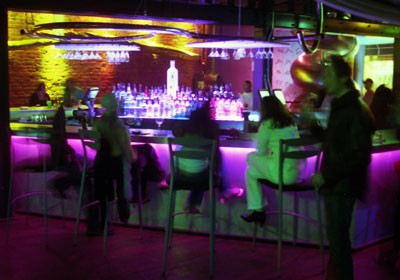Page 2 of 4
Gropper's impression ("as a northerner") is that segregation uptown is a Southern thing, not a local phenomenon. But uptown Charlotte has undergone a makeover in recent history that sets it apart from many Southern cities still struggling to revitalize their central cores. Dozens of bars, restaurants and clubs compete for customers. More upper-middle class and affluent whites have returned to the center city, and luxury condos have replaced old, predominantly black, working-class neighborhoods. Everybody wants to stake a claim -- but that's getting harder. "Everybody's focused towards being uptown," says G-Mitch, a promoter. "I don't care what color you are."

- Radok
- The colorful bar at Menage.
Nowhere was that more visible last summer than on the main drags uptown. Cruisers clogged traffic on Tryon Street, and teenage boys -- mostly black -- in long, white T-shirts hung out with friends. All the while, well-heeled -- mostly white -- couples walked to upscale spots to sip martinis and eat tapas. But police cracked down on the cruisers and the teens, denying that race was a factor.
As the weather cooled, the issue diffused somewhat. But then the Ultimate Aggie Affair party was cancelled at Menage, prompting new charges that everyone isn't welcome uptown.
The promoters took their grievance to the Charlotte-Mecklenburg Human Relations Commission, whose director expects to finish an investigation within a few weeks. If recent history is any indicator, Menage isn't likely to suffer a stiff penalty even if the charges prove valid. Though the commission may levy a small fine, the more likely result would be an agreement to stop discriminatory treatment, commission director Willie Ratchford says. The city's public accommodations ordinance bars public places from denying a person full accommodations and privileges because of race, color, religion or national origin. But the commission investigates only five or six allegations a year, and an investigation yielding proof of bias is even more rare, Ratchford says.
The commission is waiting to see if Wind files an official complaint before instigating an investigation against The Forum, Ratchford says. It's not likely they'll receive one -- Wind says he just wants to move on. "It's kind of blown over," Wind says. But that last weekend of November he was angry and frustrated. After being told they couldn't enter, Wind claims, the club sent an Asian employee out to talk to the group who told Wind and his buddies that an incident the previous week involving Asians had left the club reluctant to allow Asians in. Wind couldn't believe the bouncers thought they might cause trouble. "I'm not a huge guy," he says. "I don't dress extremely thuggish or look like I could be a liability to anybody."
The Forum's spokeswoman, Carol Adams, didn't want to comment on the record about Wind's complaint but did say three members of its management team are Asian. "They want it to be an all-inclusive club that promotes diversity," Adams says.
The Forum sounded a conciliatory tone in an e-mail to Wind, which stated: "We apologize for the treatment you experienced outside The Forum. The atmosphere that we intend to promote in our venue is one of inclusion, not exclusion, and I'm sorry if you were treated in any manner that made you feel unwelcome. As owners of The Forum, and members of an ethnic minority as well, we can appreciate your concern that you may have been singled out due to your ethnicity ... let me assure you that we have no policy that would exclude anyone due to their ethnic background."
Drakeford won't comment on the Menage or Forum incidents, but she did say she believes clubs are segregated by race, although -- the incident at Menage aside -- she doesn't think it's intentional. "It's just where we are. If you go downtown on a Saturday night, there's still black clubs and white clubs. That's just being honest."
How does that affect perceptions? Well, it can color how people feel they're treated. When Thompson and her two friends received poor treatment at a sports bar, the trio thought racism was to blame. "She wasn't even finished eating," Thompson says, pointing to her friend Keisha. "They just took her food and threw it in the trash." (A handful of bar employees who wouldn't permit us to use their names said some African-Americans may experience poor service because some servers believe black patrons don't tip as well as white patrons.)
Several white club and bar owners declined to talk with us for this story, but a few were refreshingly candid. Gropper of Hoops & Dreams says he's tried to build a diverse clientele but believes many business owners aren't color blind -- and neither are their customers. He describes one fear this way: "If a business owner has too many black people in the establishment, a lot of white people will walk out."